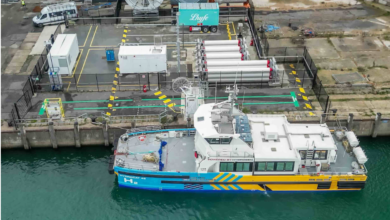H2 Clipper provides updates on Pipeline-In-The-Sky Airship
H2 Clipper anticipates completing the construction of a prototype in 2025 to fly its first full-sized airship in 2028.

H2 Clipper, Inc has completed a simulated wind tunnel test using computational fluid dynamics (CFD) of its hydrogen-powered “Pipeline-In-The-Sky” airship.
The analysis (as shown in the attached images) confirms that the airship’s aerodynamic design achieves an extremely low level of residual drag and is another step in validating the airship’s operating performance and the company’s cost modelling.
The H2 Clipper airship design is the result of radically innovating and re-thinking lighter-than-air flight for global fuel and cargo transport. The airships offer unprecedented speed, payload, and cost advantages: 70% less than the cost of traditional air freighters, payloads up to 277 tons (252 tonnes), 7 to 10 times faster than shipping by truck or cargo vessel, and 100% carbon-free.
H2 Clipper has received multiple patents on using an airship to deliver liquid hydrogen to market, offering economic and logistical advantages over other methods of bulk hydrogen delivery. By transporting cheap clean power produced from renewable sources to markets with high energy demand, H2 Clipper solves the economical and effective challenges of transporting hydrogen from where it can be produced at the lowest cost to where it is most needed.
In 2021, H2 Clipper was selected for inclusion in Dassault Systèmes’ exclusive 3DEXPERIENCE® Lab accelerator program. Using the Dassault Systèmes 3DEXPERIENCE platform, H2 Clipper can simulate and rapidly evaluate complex engineering design concepts on the path to the optimal design for a 21st century version of the hydrogen dirigible.
Rinaldo Brutoco, H2 Clipper founder and CEO, said, “The successful analysis with CFD marks a major milestone for the development of the ‘Pipeline-In-The-Sky’ airship and brings H2 Clipper one step closer to realizing our goal of providing the fastest, most flexible, and efficiently scalable way to transport fuel-grade hydrogen to market worldwide.”
